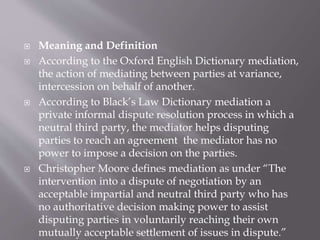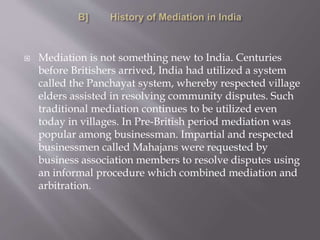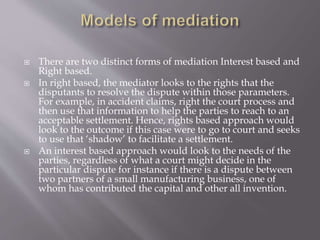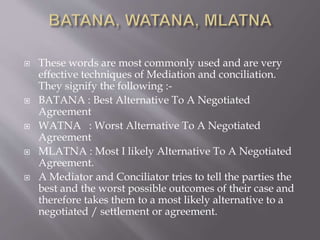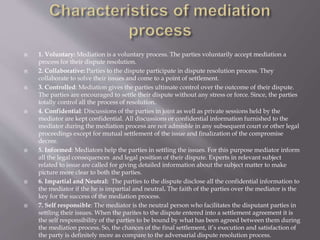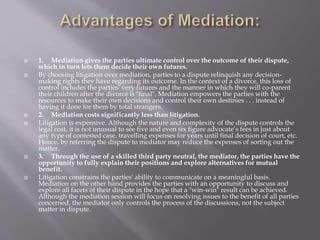Mediation
- 2. Mediation Mediation is basically negotiations carried out with the assistance of a neutral third party; however recommendations of a mediator are not binding. In ultimate analysis the concept of mediation is based on all innate sense of decency and an acceptance of shared values in the community, even as they are imperiled as a result of the conflict.
- 3. Meaning and Definition According to the Oxford English Dictionary mediation, the action of mediating between parties at variance, intercession on behalf of another. According to Black’s Law Dictionary mediation a private informal dispute resolution process in which a neutral third party, the mediator helps disputing parties to reach an agreement the mediator has no power to impose a decision on the parties. Christopher Moore defines mediation as under “The intervention into a dispute of negotiation by an acceptable impartial and neutral third party who has no authoritative decision making power to assist disputing parties in voluntarily reaching their own mutually acceptable settlement of issues in dispute.”
- 4. Mediation is not something new to India. Centuries before Britishers arrived, India had utilized a system called the Panchayat system, whereby respected village elders assisted in resolving community disputes. Such traditional mediation continues to be utilized even today in villages. In Pre-British period mediation was popular among businessman. Impartial and respected businessmen called Mahajans were requested by business association members to resolve disputes using an informal procedure which combined mediation and arbitration.
- 5. Selection 89 of code of Civil Procedure 1908 provides that as a process for the settlement of disputes outside the court. Court may refer the dispute to mediation (section 89 (1) (d)) and for mediation, the court shall effect a compromise between the parties and shall follow such procedure as may be prescribed. (Section 89 (2) (d)).
- 6. There are two distinct forms of mediation Interest based and Right based. In right based, the mediator looks to the rights that the disputants to resolve the dispute within those parameters. For example, in accident claims, right the court process and then use that information to help the parties to reach to an acceptable settlement. Hence, rights based approach would look to the outcome if this case were to go to court and seeks to use that ‘shadow’ to facilitate a settlement. An interest based approach would look to the needs of the parties, regardless of what a court might decide in the particular dispute for instance if there is a dispute between two partners of a small manufacturing business, one of whom has contributed the capital and other all invention.
- 7. 1. Introduction 2. Joint Session with parties 3. Private Session with parties separately 4. Joint Session with parties 5. Mediation Agreement
- 8. These words are most commonly used and are very effective techniques of Mediation and conciliation. They signify the following :- BATANA : Best Alternative To A Negotiated Agreement WATNA : Worst Alternative To A Negotiated Agreement MLATNA : Most I likely Alternative To A Negotiated Agreement. A Mediator and Conciliator tries to tell the parties the best and the worst possible outcomes of their case and therefore takes them to a most likely alternative to a negotiated / settlement or agreement.
- 9. 1. Voluntary: Mediation is a voluntary process. The parties voluntarily accept mediation a process for their dispute resolution. 2. Collaborative: Parties to the dispute participate in dispute resolution process. They collaborate to solve their issues and come to a point of settlement. 3. Controlled: Mediation gives the parties ultimate control over the outcome of their dispute. The parties are encouraged to settle their dispute without any stress or force. Since, the parties totally control all the process of resolution. 4. Confidential: Discussions of the parties in joint as well as private sessions held by the mediator are kept confidential. All discussions or confidential information furnished to the mediator during the mediation process are not admisble in any subsequent court or other legal proceedings except for mutual settlement of the issue and finalization of the compromise decree. 5. Informed: Mediators help the parties in settling the issues. For this purpose mediator inform all the legal consequences and legal position of their dispute. Experts in relevant subject related to issue are called for giving detailed information about the subject matter to make picture more clear to both the parties. 6. Impartial and Neutral: The parties to the dispute disclose all the confidential information to the mediator if the he is impartial and neutral. The faith of the parties over the mediator is the key for the success of the mediation process. 7. Self responsible: The mediator is the neutral person who facilitates the disputant parties in settling their issues. When the parites to the dispute entered into a settlement agreement it is the self responsibility of the parties to be bound by what has been agreed between them during the mediation process. So, the chances of the final settlement, it’s execution and satisfaction of the party is definitely more as compare to the adversarial dispute resolution process.
- 10. 1. Mediation gives the parties ultimate control over the outcome of their dispute, which in turn lets them decide their own futures. By choosing litigation over mediation, parties to a dispute relinquish any decision- making rights they have regarding its outcome. In the context of a divorce, this loss of control includes the parties' very futures and the manner in which they will co-parent their children after the divorce is "final". Mediation empowers the parties with the resources to make their own decisions and control their own destinies . . . instead of having it done for them by total strangers. 2. Mediation costs significantly less than litigation. Litigation is expensive. Although the nature and complexity of the dispute controls the legal cost, it is not unusual to see five and even six figure advocate’s fees in just about any type of contested case, travelling expenses for years until final decision of court, etc. Hence, by referring the dispute to mediator may reduce the expenses of sorting out the matter. 3. Through the use of a skilled third party neutral, the mediator, the parties have the opportunity to fully explain their positions and explore alternatives for mutual benefit. Litigation constrains the parties' ability to communicate on a meaningful basis. Mediation on the other hand provides the parties with an opportunity to discuss and explore all facets of their dispute in the hope that a "win-win" result can be achieved. Although the mediation session will focus on resolving issues to the benefit of all parties concerned, the mediator only controls the process of the discussions, not the subject matter in dispute.
- 11. 4. Mediation provides an opportunity to resolve disputes in much less time than required if the courts are used. It takes a long time to get to court. It is not unusual for a contested case to remain on the court's docket for many months . . . sometimes years. The mediation process is much quicker than litigation. Sessions can be scheduled on much shorter notice. The mediation process itself takes less time than litigation. Finally, the chances of a postponement are far less with mediation than with litigation. 5. Mediation reduces the risk of future discord and endless litigation. Mediation on the other hand, provides the parties with a vehicle to work together to arrive at mutually agreeable decisions . . . decisions that will define their relationship for many years to come. In the final analysis, isn't it better to work together towards a "win- win" scenario than to abrogate your decision-making rights to a total stranger? 6. Mediation works. Litigation can and many times does cause significant pain and anger, especially in the area of family law. It can become so hostile that the parties spend an inordinate amount of time posturing for their day in court. That's why the vast majority of civil cases must be settling out of court through the use of mediation
- 12. Mediation has its limitations. It is effective and useful only in certain types of civil litigation. It can be resorted only when the parties mutually agree. Parties to the litigation have set their mind that settlement means a giving up a part of his rights or claim and showing a concession to the other side. So they are not ready for mediation. The major part of the expenditure for a litigant would have been incurred when he commences the litigation by ways of court fee and lawyer’s fee and litigation does not seek any incentive for mediation. So they are man reluctant to go for mediation. Some lawyers have fear in their mind that if the case is settled through mediation, they will lose the fee. Lack of trained mediators in mediation process. No certain procedure is prescribed by the statute for mediation.
- 13. Thank You…..


